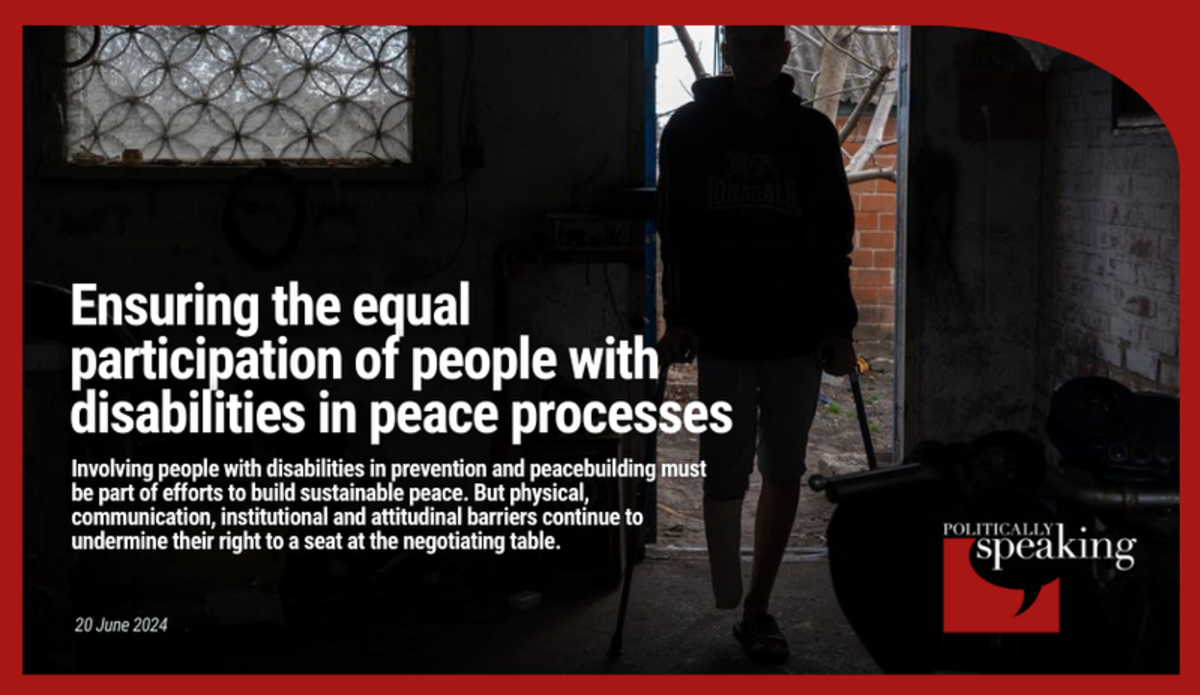Involving people with disabilities in prevention and peacebuilding must be part of efforts to build sustainable peace. But physical, communication, institutional and attitudinal barriers continue to undermine their right to a seat at the negotiating table.
Over a billion people around the world have a disability, and more than half of them live in areas affected by armed conflicts. Civilians with disabilities are particularly vulnerable to conflict-related risks, including forcible displacement, hunger and violence. Yet, their needs, rights and voices are too often not fully considered during peace processes.
“In war those with disabilities are often presented as victims, denied equality in humanitarian support and excluded from peace processes,” said Giles Duley, UN global advocate for persons with disabilities, adding that “it is time for change.”
Agents of change
To recognize the disproportionate impact of armed conflict on people with disabilities and the need to fully involve them in peacebuilding efforts, on 20 June 2019, the Security Council adopted resolution 2475.
The resolution calls on Member States and parties to armed conflict to protect people with disabilities in conflict situations and to ensure they can access basic services, humanitarian assistance and justice.
It also urges the equal and meaningful participation and representation of people with disabilities in humanitarian action and peacebuilding, to make sure they can become agents of change and take part in decision-making.
The resolution “[e]mphasizes the importance of building capacity and knowledge of the rights and specific needs of persons with disabilities across UN peacekeeping and peacebuilding actors and urges Member States to play a central role in this regard.”
One benefit of the adoption of resolution in 2019 is that the Council has been increasingly focusing on the protection needs of persons with disabilities in its country-specific resolutions.
For instance, in 2021, the Council mandated the UN Assistance Mission in Somalia (UNSOM), managed by the Department of Political and Peacebuilding Affairs (DPPA), to support the country in enabling the full, equal and meaningful participation of all Somalis, including people with disabilities, in peace and political processes. In recent years, Somalia has made substantive progress on the protection of the rights of people with disabilities, highlighted by UNSOM in December 2023.
In 2023, the UN Mission in South Sudan (UNMISS), managed by the Department of Peacekeeping Operations, also promoted the active participation of people with disabilities, including through a workshop aimed at training participants on advocacy skills and providing them with better knowledge of their rights. “Our physical shortcomings do not mean that we can’t have constructive opinions about South Sudan’s future. We have a role to play in the ongoing peace process and it is time we are no longer ignored by our leaders,” said Ahmed Ernick, one of the participants.
Barriers to implementation
Overall, however, implementation of the resolution on the ground remains challenging. People with disabilities in conflict and post-conflict settings often face physical, communication, institutional and attitudinal barriers preventing their full and meaningful participation in decision-making and limiting their rights.
A study conducted by Handicap International in 2022 in Yemen, where 4.8 million people are estimated to have at least one form of disability, shows that conflict continues to hinder their access to humanitarian assistance as well as basic and specialized services. The study also reports cases of people being separated from their caregivers or their mobility aids.
In November 2023, the Special Rapporteur on the rights of persons with disabilities, Heba Hagrass, warned about difficulties faced by people with disabilities in accessing safe places in Gaza. “People with disabilities must not be “left behind” because their families and relief teams are unable to give them the necessary support,” she said.
According to disability rights groups and experts, moreover, the lack of accessible public transportation and documents continues to undermine the meaningful participation of people with disabilities in conflict resolution, together with a lack of funding and prejudice.
Differentiating between conflict-induced disabilities and disabilities that predate or are unrelated to conflict can also fuel discrimination and create tensions among the community in peacebuilding efforts.
At the same time, when given a seat at the negotiating table, people with disabilities are often represented as a homogenous group, leading to insufficient understanding of the broad variety of needs and perspectives of people with different disabilities, including intellectual and psychosocial disabilities.
Way forward
To make sure the participation of persons with disabilities in peace processes becomes meaningful, activists and experts highlight the need to collect and analyze disaggregated data. This would ensure the specific and different needs of people with disabilities can be identified and addressed.
At the same time, as called for by resolution 2475, people with disabilities need to be regularly invited to the negotiating table, as well as to Security Council briefings, without being limited to sharing their disability-related experiences.
“[P]ersons with disabilities are a unique resource of knowledge and experience to build more resilient societies,” said Secretary-General António Guterres at a meeting of State Parties to the Convention on the Rights of Persons with Disabilities. “We need [their] leadership.”




